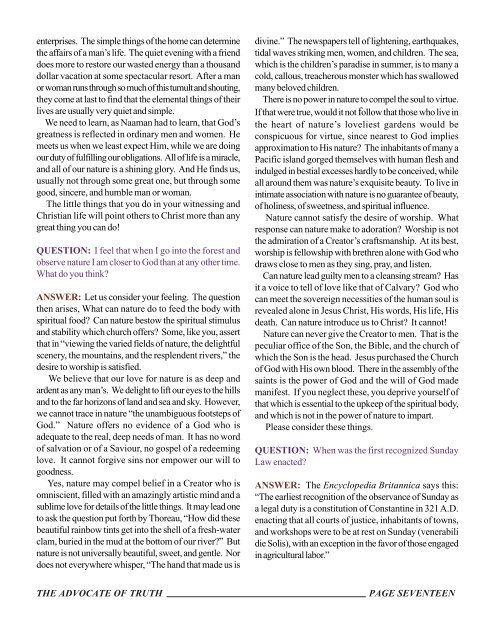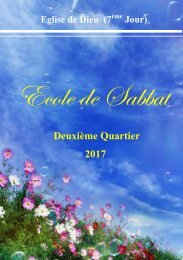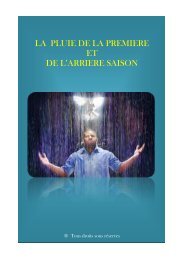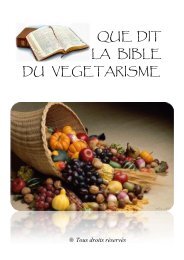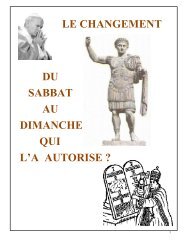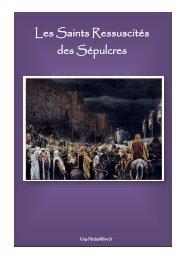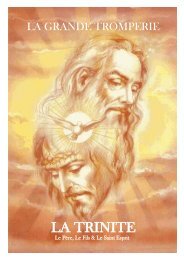The Advocate of Truth
The Advocate of Truth is the official organ of The Church of God (7th Day) with headquarters at Salem, West Virginia
The Advocate of Truth is the official organ of The Church of God (7th Day) with
headquarters at Salem, West Virginia
You also want an ePaper? Increase the reach of your titles
YUMPU automatically turns print PDFs into web optimized ePapers that Google loves.
enterprises. <strong>The</strong> simple things <strong>of</strong> the home can determine<br />
the affairs <strong>of</strong> a man’s life. <strong>The</strong> quiet evening with a friend<br />
does more to restore our wasted energy than a thousand<br />
dollar vacation at some spectacular resort. After a man<br />
or woman runs through so much <strong>of</strong> this tumult and shouting,<br />
they come at last to find that the elemental things <strong>of</strong> their<br />
lives are usually very quiet and simple.<br />
We need to learn, as Naaman had to learn, that God’s<br />
greatness is reflected in ordinary men and women. He<br />
meets us when we least expect Him, while we are doing<br />
our duty <strong>of</strong> fulfilling our obligations. All <strong>of</strong> life is a miracle,<br />
and all <strong>of</strong> our nature is a shining glory. And He finds us,<br />
usually not through some great one, but through some<br />
good, sincere, and humble man or woman.<br />
<strong>The</strong> little things that you do in your witnessing and<br />
Christian life will point others to Christ more than any<br />
great thing you can do!<br />
QUESTION: I feel that when I go into the forest and<br />
observe nature I am closer to God than at any other time.<br />
What do you think?<br />
ANSWER: Let us consider your feeling. <strong>The</strong> question<br />
then arises, What can nature do to feed the body with<br />
spiritual food? Can nature bestow the spiritual stimulus<br />
and stability which church <strong>of</strong>fers? Some, like you, assert<br />
that in “viewing the varied fields <strong>of</strong> nature, the delightful<br />
scenery, the mountains, and the resplendent rivers,” the<br />
desire to worship is satisfied.<br />
We believe that our love for nature is as deep and<br />
ardent as any man’s. We delight to lift our eyes to the hills<br />
and to the far horizons <strong>of</strong> land and sea and sky. However,<br />
we cannot trace in nature “the unambiguous footsteps <strong>of</strong><br />
God.” Nature <strong>of</strong>fers no evidence <strong>of</strong> a God who is<br />
adequate to the real, deep needs <strong>of</strong> man. It has no word<br />
<strong>of</strong> salvation or <strong>of</strong> a Saviour, no gospel <strong>of</strong> a redeeming<br />
love. It cannot forgive sins nor empower our will to<br />
goodness.<br />
Yes, nature may compel belief in a Creator who is<br />
omniscient, filled with an amazingly artistic mind and a<br />
sublime love for details <strong>of</strong> the little things. It may lead one<br />
to ask the question put forth by Thoreau, “How did these<br />
beautiful rainbow tints get into the shell <strong>of</strong> a fresh-water<br />
clam, buried in the mud at the bottom <strong>of</strong> our river?” But<br />
nature is not universally beautiful, sweet, and gentle. Nor<br />
does not everywhere whisper, “<strong>The</strong> hand that made us is<br />
divine.” <strong>The</strong> newspapers tell <strong>of</strong> lightening, earthquakes,<br />
tidal waves striking men, women, and children. <strong>The</strong> sea,<br />
which is the children’s paradise in summer, is to many a<br />
cold, callous, treacherous monster which has swallowed<br />
many beloved children.<br />
<strong>The</strong>re is no power in nature to compel the soul to virtue.<br />
If that were true, would it not follow that those who live in<br />
the heart <strong>of</strong> nature’s loveliest gardens would be<br />
conspicuous for virtue, since nearest to God implies<br />
approximation to His nature? <strong>The</strong> inhabitants <strong>of</strong> many a<br />
Pacific island gorged themselves with human flesh and<br />
indulged in bestial excesses hardly to be conceived, while<br />
all around them was nature’s exquisite beauty. To live in<br />
intimate association with nature is no guarantee <strong>of</strong> beauty,<br />
<strong>of</strong> holiness, <strong>of</strong> sweetness, and spiritual influence.<br />
Nature cannot satisfy the desire <strong>of</strong> worship. What<br />
response can nature make to adoration? Worship is not<br />
the admiration <strong>of</strong> a Creator’s craftsmanship. At its best,<br />
worship is fellowship with brethren alone with God who<br />
draws close to men as they sing, pray, and listen.<br />
Can nature lead guilty men to a cleansing stream? Has<br />
it a voice to tell <strong>of</strong> love like that <strong>of</strong> Calvary? God who<br />
can meet the sovereign necessities <strong>of</strong> the human soul is<br />
revealed alone in Jesus Christ, His words, His life, His<br />
death. Can nature introduce us to Christ? It cannot!<br />
Nature can never give the Creator to men. That is the<br />
peculiar <strong>of</strong>fice <strong>of</strong> the Son, the Bible, and the church <strong>of</strong><br />
which the Son is the head. Jesus purchased the Church<br />
<strong>of</strong> God with His own blood. <strong>The</strong>re in the assembly <strong>of</strong> the<br />
saints is the power <strong>of</strong> God and the will <strong>of</strong> God made<br />
manifest. If you neglect these, you deprive yourself <strong>of</strong><br />
that which is essential to the upkeep <strong>of</strong> the spiritual body,<br />
and which is not in the power <strong>of</strong> nature to impart.<br />
Please consider these things.<br />
QUESTION: When was the first recognized Sunday<br />
Law enacted?<br />
ANSWER: <strong>The</strong> Encyclopedia Britannica says this:<br />
“<strong>The</strong> earliest recognition <strong>of</strong> the observance <strong>of</strong> Sunday as<br />
a legal duty is a constitution <strong>of</strong> Constantine in 321 A.D.<br />
enacting that all courts <strong>of</strong> justice, inhabitants <strong>of</strong> towns,<br />
and workshops were to be at rest on Sunday (venerabili<br />
die Solis), with an exception in the favor <strong>of</strong> those engaged<br />
in agricultural labor.”<br />
THE ADVOCATE OF TRUTH<br />
PAGE SEVENTEEN


